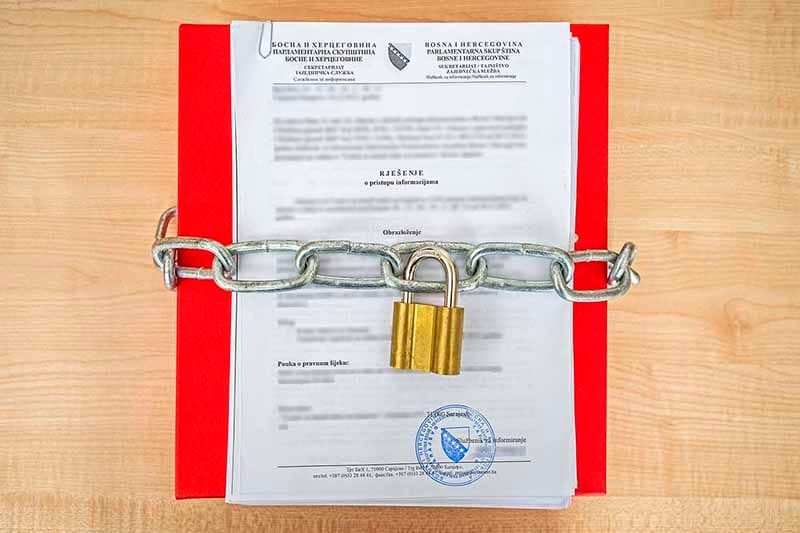The state Agency for Drugs and Medicine Equipment has spent nearly 90,000 KM over three years in the interest of establishing good relations with clients.
Agency Director Nataša Grubiš approved a request from the Center for Investigative Reporting in Sarajevo (CIN) to look at records justifying this spending. But her assistant Zoran Josipović resisted. On his own and with no direction from above, he separated out a small pile of documents and said: “That will do.”
When A CIN reporter pointed out to him that his boss, the director, had already approved release of all the papers, he said: “I will give you this because it had been already approved, but no one will ever get this again.” When the reporter reminded Josipović that according to the law she – and every citizen – have the right to read information in the possession of public authorities, he said: ”Don’t try to argue with me about rights. You’re not up to it!”
Though laws in Bosnia and Herzegovina (BiH) allow the public free access to information, in reality the freedom is severely limited.
According to a CIN investigation, records on public expenditures are often hidden and when someone lawfully asks to see them, they are refused and given baseless excuses. Bureaucrats are basically allowed to decide whether to give up information on their own individual and arbitrary interpretation of the law.

From One Request to Another
The BiH Law on Freedom of Access to Information was passed in 2000 under pressure from the international community. The following year, both entities – the Federation of BiH (FBiH) and Republika Srpska (RS) — passed similar laws that were to improve transparency and accountability by making information open to the public.
“Such an approach strengthens the public’s confidence in government bodies,” said Mehmed Halilović, a media law expert.
According to the laws, all citizens and legal entities have the right to information under the control of government agencies, unless publishing it could endanger state security, invade personal privacy, or imperil commercial records. If an agency does not have the information requested, it has must forward the request to the agency that does have it. There is no obligation to collect the data just to satisfy a request.
To get information, citizens must ask the agency that has it in writing. The request must make clear precisely what is being sought and in what format and where it should be sent. Citizens do not have to reveal why they want information or what they are going to do with it.
Agencies and public companies are supposed to appoint information officials to deal with requests, and to publish on their web sites a list of the information it has and the process for requesting access to it.
An investigation by Analitika Center for Social Research however, shows that one-third of 66 government departments have not gotten this material posted as required nearly 15 years after the law went into effect.
Institutions are required to respond to information requests within 15 days. If they fail, citizens may complain of administrative silence to inspectors.
Since the end of 2013, according to the state legislation, unlike the entity ones, inspectors have been empowered to hand out fines of up to 15,000 KM for administrative silence. They never have. Eight complaints have gone to inspectors since late 2013, but after getting warnings, the departments involved answered the information requests.
If a request asks for information that contains personal or confidential commercial data or records that could harm the state, institutions are supposed to pass on as much of the information asked for as possible or to reject the request after fully explaining why.
However, before that final decision, agencies are required to carry out a so-called “test of public interest.” They must consider the circumstances of a request and the exemption that may apply. The agencies are supposed to override the exemption when the public interest in releasing the information is greater than in withholding it.

The Ombudsman for Human Rights in BiH which monitors access of information, say that agencies are refusing requests and withholding information without considering the public good of a release. Many agencies do not understand the rational of the test.
“Without this element, all solutions that are passed are not complete and as such can be contested with an appeal,” said Ombudswoman Jasminka Džumhur.
Filing an FOIA request is free, but actually getting information costs money. Entity laws, allow for up to 10 pages of copies for free. The state law grants 20 pages for free. Every additional page can cost up to a half KM.
Copies of property or incorporation documents cost according to price lists of the agency giving out the information. These can be costly.
Haphazard Interpretation of Law
According to CIN’s investigation, getting information can hinge on what officer receives the requests, the government department involved, and the information being requested. The same departments may say yes to giving out information one day and no the next, justifying this as protection of personal or commercial data.
CIN reporters, for example, checked out a suspicion that civil service vacancies were put out pro forma for jobs that had already been taken by favorites holding short-term contracts and already working in the departments doing the hiring.
CIN mailed a request for information to 54 state-level institutions asking for the names of civil servants and the type of contract they held. Only 33 responded, while 21 ignored the requests or refused to disclose information on grounds that it would violate the privacy of employees.
Based on records collected from the agencies CIN found that over the past five years, at least 260 people have been hired following a call for applications to positions they had already worked at either as freelancers or short-term contractors.
Upon receiving a FOIA request, government departments often turn to the Personal Data Protection Agency in BiH for guidance on whether to disclose certain information.
This is what the Secretariat of the BiH Parliament did when CIN asked for access to three years worth of records on salaries and allowances for the 57 legislators.
Instead of the actual records, the Secretariat sent reporters a list of the laws and by-laws that regulate the legislators’ earnings. The Secretariat said in a letter that no information about the individual amounts was available.
“There were different interpretations if the salaries were personal right of individuals or not. The law on the protection of personal data has simply protected some things and we were carried away with inertia,” said the information officer for the Parliament Zlatko Vukmirović.
However, the reporters asked for and received the same records from the BiH Ministry of Finances and Treasury. The records show that professional MPs with an average salary of 4,500 KM have the right to additional allowances that can increase their monthly income up to 8,000 KM.
According to the Personal Data Protection Agency, officials dealing with FOIA requests have to distinguish between information that should be disclosed and personal data that must be protected, such as someone’s social service number, address or telephone number. Even these records must be disclosed if there’s public interest involved.
“It is the easy to recognize public interest. Actually, it is fully embedded in hiring into civil service. Citizens should know by default the salaries and everything else related to civil servants,” a deputy director of the Agency Samira Čampara told CIN.
Government officials have a number of excuses for turning down requests from reporters for information wanted on behalf of the public. They ask that these requests be submitted on letterhead with a stamp and the signature of an authorized person. Then, they typically cite protection of commercial interest as the most common excuse to reject requests for information about contracts with private companies, or about public procurement, or award of concession rights for mining of natural resources.

From Complaint to Court
Government departments that don’t want to disclose information often hide behind exemptions from other laws passed after the FOIA law, but not harmonized with it, such as the Law on Taxes, the Law on Confidential Information or the Law on Personal Data Protection.
For example, officials from The Power Utility of Croatian Community Herceg-Bosnia in Mostar did not want to explain to the public why they failed to collect around 1 million KM in unpaid electricity from three private companies. They refused the request saying that these records are considered business secrets based on the Law on Public Companies in FBiH, their by-laws and code of ethics.
Halilović the media law expert, thinks that the authorities who quickly and easily voted in favor of the information laws 15 years ago did not understand what it had given to the public – a broad freedom and a right to monitor what authorities are doing. They have changed their minds. Over time they have violated the right they granted and reduced it with new laws.
In practice this means, for example, that any request for salaries and allowances of public officials in the RS is turned down by default. The Labor Law does not qualify this information as public record.
Transparency International BiH which has been fighting for years for enforcement of freedom of information laws says department in such cases must act in accordance with the FOIA law – and not exclusively according to the Labor Law. It encourages citizens refused information to complain.
According to the law, a decision turning down a freedom of request must specify a complaint authority. Usually, this is the head of an agency or the Complaint Council at the Council of Ministers. The Ombudsmen received 218 citizens’ complaints last year about government agencies refuse their requests to see records.
If a complaint is tossed out, the citizens can sue in the Court of BiH, county courts in the RS and cantonal courts in the FBiH. If a court upholds a complaint, the agency must revisit its decision, although there is no guarantee that it would disclose information.
Over the past six years, TI has filed 73 lawsuits on all levels except in the District of Brčko. Of these, 34 were decided in TI’s favor; four case were lost and 28 trials are ongoing. In seven cases, a department decided to disclose information, while the case was still being tried.
Halilović said that in his capacity as an assistant to the FBiH ombudsmen for media, he recommended filing lawsuits to all parties who think their rights have been taken from them. He says that the ombudsmen and media need to press citizens to exercise their right to access to information and to show the authorities that they must behave according to the law.
“There are no authorities which would automatically behave in line with the law unless they are forced to. Thus, we will make them!” Halilovic said.








